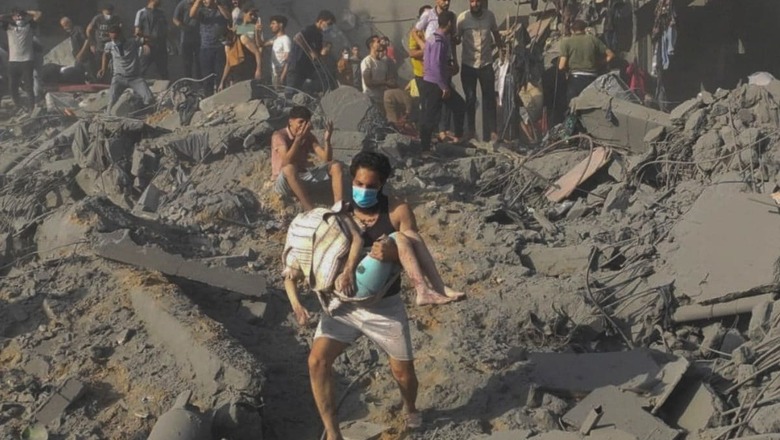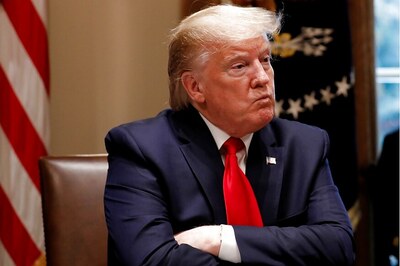
views
In A Tale of Love and Darkness, Israeli novelist and essayist Amos Oz highlights a typical Jewish dilemma, despair and desperation for survival. In Jerusalem, he writes, “people always walked rather like mourners at a funeral, or latecomers at a concert”. He explains, “First they put down the tip of their shoe and tested the ground. Then, once they had lowered their foot they were in no hurry to move it: we had waited two thousand years to gain a foothold in Jerusalem, and were unwilling to give it up. If we picked up our foot someone else might come along and snatch our little strip of land. On the other hand, once you have lifted your foot, do not be in a hurry to put it down again: who can tell what menacing nest of vipers you might step on.”
This innate sense of insecurity, the fear of getting uprooted again, and the anxiety of being persecuted and killed selectively remain deeply etched in a Jewish psyche, which explains why Israel tends to pursue a maximalist approach while dealing with its enemies. In its ongoing war against Hamas too, it has taken the same path of complete decimation of its adversary. But as Israel goes for an all-out war in Gaza, the murmurs are already being heard about large and ever-increasing civilian casualties there. It is being accused of not caring enough for civilian lives caught in the crossfire between the Israeli forces and Hamas.
What these critics, most of them well-meaning, don’t realise is that Israel has been facing an existential war since its inception, and its inhabitants, Jews, have been persecuted for millennia almost everywhere in the world, with India being an exception where they were given both refuge and respect. Such was their plight that when they were not facing a jhatka-style of execution, they would be in for a halal-type of treatment, facing Shylock-ian discrimination for being rich, educated and successful.
Israelis believe, and not without reasons, that they not just need to fight the enemy but also make an example of it. (Remember how they ‘curated’ the killings of those involved in the murder of the Israeli athletes in the 1972 Munich Olympics!) For, if they don’t fight, and fight resolutely and spectacularly, they stare at being brutally exterminated. Howsoever hard the Left-‘liberal’ commentariat would want to connect the Middle Eastern crisis to the Palestinian plight, the fact is the enemies of Israel would not bargain for anything less than the complete destruction of the Jewish State and the total annihilation of the Jews. Everything else is just a vacuous play of words.
However, to see the ongoing Israel-Hamas war from the prism of the Middle East alone would be shortsighted. In fact, the latest conflict has all the indications of being an extension of the Ukraine war. Worse, the global arena is slowly but surely getting consolidated into two large blocs—one led by the US mostly comprising the democracies of the West and the East, and the other being spearheaded by China, with Russia, Iran and others being an important component of the grouping.
The phenomenon, which took shape during the Ukraine war, when the US-led NATO’s Eastward expansion, which George F Kennan, who had formulated the tenets that guided US policy toward the Soviet Union for a half-century, called the “most fateful error of American policy in the entire post-Cold War era”, pushed Russia deep into the Chinese orbit. In the process, the Americans—of course, at the Western European prodding—made an enemy out of Vladimir Putin, who, as per former US President Bill Clinton, was initially keen to join the Western bloc before he was repeatedly rebuffed and humiliated to shake hands with Xi Jinping.
Israel, to its credit, just like India, could see the fallacy of the Ukraine misadventure. It avoided joining the West’s sanctions against Russia, and rejected repeated Ukrainian pleas to sell Kiev military goods. The Israeli government was also careful enough to maintain a fine balance between the West and Russia. In fact, all through the Ukraine war, Israeli Prime Minister Benjamin Netanyahu made multiple visits to the Kremlin. Moscow, too, appreciated Tel Aviv’s departure from the Western fold.
All this could have worked well had the Ukraine war gone as per the Russian plan. Putin, originally, saw it a sharp, swift operation. But he has, instead, landed himself into a stalemate-kind of situation. That makes his position a bit precarious, though Putin isn’t as weak as the West wants to make him appear. Further, what the West is yet to appreciate is that a weakened Putin is good news for Xi Jinping.
As the Ukraine war gets dragged on, Putin is getting uneasy, desperate and angry. Now that’s where comes the Russian move to host a high-level Hamas delegation, ostensibly to discuss the violence that the Islamist outfit itself had orchestrated in the first place. Officially, the move was aimed at delivering the release of Russian nationals held hostage by Hamas. But in reality, this was Putin’s way of sending Washington a stern message, though Tel Aviv might be feeling the pinch the most.
Anyone who has tracked the life of Putin would know he isn’t anti-Semite by any stretch of imagination. In fact, in his early days as President, he often emphasised upon the need for Russia to have close relations with Israel. Even today, for all his Hamas optics, Putin has ensured anti-Semitism doesn’t get any footholds in Russia. Following the storming of an airport in Dagestan by an Islamist mob baying for Jewish blood, the Russian authorities have acted resolutely against them, arresting scores of the rioters.
China, Iran and Russia are the three countries that must be most gleefully watching the Israel-Hamas war. China must be most satisfied because it not just places Israel, the most steadfast of the American allies, in a state of bother, but also quite literally puts a full-stop to the India-Middle East-Europe Corridor, which many believed was an antidote to the toxic Belt and Road Initiative led by China. The US has in recent years put a lot of stakes on the Abraham Accords. The Hamas’ October 7 act has literally killed it, giving China a window to make a backdoor entry into the region it has been eyeing for so long.
Iran must be happy because it has brought the nation back in the Middle Eastern scheme of things, besides pushing Israel and Saudi Arabia—and thus America—into a corner. As for Russia, the war in the Middle East means the US-led West is no longer looking at Ukraine—a best-case scenario for Putin.
Hamas’ act of terrorism in Israel has pushed the polarising Ukraine discourse forward. The world today is far more divided between the American and Chinese camps than it was before Ukraine. Worse, things have, of late, gone more in China’s favour—though it’s primarily because of the blunders and of the misplaced priorities of the US-led West. In this scheme of things, countries that could see the fallacy of Ukraine stand to lose the most. Today, it’s Israel. Tomorrow it can be India. Pakistan, after all, is more than willing to piggy-ride the Dragon to unleash jihadi terror on India even at the cost of self-annihilation.
Any such endeavour, however, will only push the world on the brink of global war.
Just before the two World Wars, no one thought we were so close to such cataclysmic events. But then Archduke Franz Ferdinand was suddenly assassinated on June 28, 1914. And on September 1, 1939, Germany launched a surprise attack on Poland. Are we, thus, moving towards the third? We don’t know it yet. What we know for sure is that this time too we would be as surprised and startled as we were in 1914 and 1939 if and when the big war starts. And, worse, this time too, we might do absolutely nothing to stop it.


















Comments
0 comment